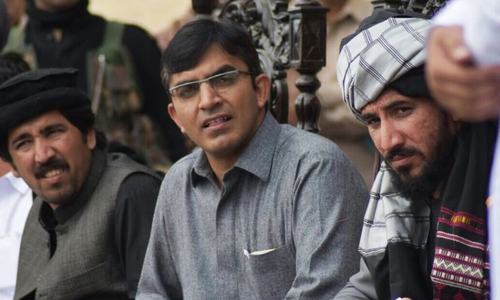The chairman of Senate functional committee on human rights, Senator Mustafa Nawaz Khokhar, during a meeting on Wednesday, raised questions on the process through which names were placed on the Exit Control List (ECL) and observed that the interior ministry should make the procedure transparent.
Inquiring about the process of placing names on the ECL, Khokhar said two members of the Senate committee, MNAs Mohsin Dawar and Ali Wazir, were placed on the ECL and Hamza Shahbaz was also stopped from travelling abroad.
Additional Interior Secretary Dr Tariq Sardar briefed the committee that it was the federal government issued directives to the ministry about whose name to be placed on the ECL.
The name of Hamza Shahbaz, the leader of opposition in Punjab Assembly, had not been placed on the list, the secretary added.
Human Rights Minister Dr Shireen Mazari also informed the committee that Hamza Shahbaz's name was not on the ECL. "He was stopped on NAB's request as the bureau thought that it was very likely that he [Hamza] won't return [if allowed to travel abroad]," Mazari said.
The interior ministry official said the names of Dawar and Wazir were not on the ECL, following which Mazari added that their names must be on the provisional national identification list (PNIL).
The committee asked for a briefing on the PNIL — a list said to be maintained and administered by the Federal Investigation Agency (FIA). The committee observed that they only knew about the ECL and the blacklist, and asked what other lists were maintained to stop people from travelling abroad.
At this Dawar said that they were "stopped at the airport and told that their names were on the ECL".
"Three hours later, we were told that there was an FIR [registered against them] which was why our names were on the ECL," Dawar said.
"Perhaps, in the same manner, Hamza was told that his name was on the blacklist," Dawar said. "If our name is not on the ECL then why the other list being kept hidden."
The additional secretary briefed that it was the intelligence agencies and the FIA which request to put names on the PNIL.
Mazari said that she had found out from the interior ministry that the names of Dawar and Wazir were not on the ECL, but the FIA Peshawar had forwarded their name.
"[When questioned further] the ministry's officials said the FIA could give a better insight on the issue but said that names of criminals are placed on the PNIL," the minister said.
The committee then summoned the FIA director general and the Khyber Pakhtunkhwa police chief on December 17 to further deliberate on the matter.
Moreover, Senator Usman Khan Kakar commented Pashtun Tahaffuz Movement (PTM) chief Manzoor Pashteen was not even travelling abroad, now he was being restricted from going to any other province within the country.
"The Supreme Court has made it clear that even if an FIR is registered against anyone, he cannot be stopped from going abroad," he said, adding that the name of an Article 6 suspect was not on the ECL.
Issue of missing persons
Mazari said there was no space for enforced disappearances in a democracy.
"We want to change the law and solve this problem," the human rights minister said, adding that they had asked for a list of all missing persons after which they will deliberate with all stakeholders on the issue.
The minister said Balochistan National Party (BNP) Sardar Akhtar Mengal has also been contacted in this regard.
Mazari said they wanted to resolve the issue of missing persons and bring security agencies on board for lawmaking.
"The people who are being picked up should be presented [before the court of law]," she said, adding that it was the right of people to know about the whereabouts of their relatives who had been missing for years.
'Media has been told to lie for six months'
Prior to the start of the meeting, Senator Kakar raised an objection regarding the statement issued by the military's spokesperson where he had asked the media to report about 'positive' things for the next six months.
"The [ISPR] statement regarding positive reporting by the media for six months is an important statement which should be brought on the agenda," he said.
Commenting on the ISPR statement, Kakar said that the "media has been told to lie for six months".



































